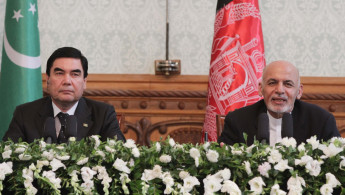Turkmenistan, Afghanistan open new rail and power links
Turkmenistan and Afghanistan have inaugurated new transport, power and communications links, Turkmenistan said Thursday, as the ex-Soviet republic touts its role rebuilding Afghanistan's conflict-torn economy.
A trio of Turkmen foreign ministry statements said Afghan President Ashraf Ghani and Turkmen leader Gurbanguly Berdymukhamedov had participated via teleconference in opening ceremonies for a new branch of the railway connecting the two countries, a new power transmission line and a fibre optic line.
The 500 kilovolt, 153-kilometre (95-mile) power transmission line connecting Kerki in Turkmenistan to Sheberghan in Afghanistan is the first leg of the Turkmenistan–Afghanistan–Pakistan (TAP) power project part-financed by the Asian Development Bank.
Afghanistan's fourth largest city, Mazar-i-Sharif, is among the cities slated to receive Turkmen electricity, according to the foreign ministry readout.
Afghanistan and Turkmenistan have been connected by rail since late 2016, and the latest branch extends the line down from the Afghan border settlement of Akina (also spelled Aqina) to Andkhoy, another Afghan town 30 kilometres south.
According to the Turkmen foreign ministry readout, the opening was "marked by the solemn dispatch from the Akina station towards the city of Andkhoy of a train consisting of 20 cars loaded with export products from Turkmenistan".
A readout on the new fibre optic line said Afghanistan's communications minister Masoumeh Khavari had praised the project as boosting Afghanistan's "e-government" and internet connectivity drive.
The cables connect the customs point of Imamnazar in Turkmenistan to Akina in Afghanistan, and Serhetabat in Turkmenistan to Torghundi in Afghanistan.
Turkmen foreign minister Rashid Meredov said in November that Turkmenistan had spent $1.25 billion on projects aimed at integration with Afghanistan.
Meredov also said Turkmenistan planned to begin this year construction of the Afghan section of a gas pipeline linking both countries with the large consumer markets of Pakistan and India.
The pipeline link known as TAPI -- long delayed amid questions over financing and security -- would be more than 1,800 kilometres long and transport more than 30 billion cubic metres of natural gas annually from Turkmenistan's giant Galkynysh gas field.





 Follow the Middle East's top stories in English at The New Arab on Google News
Follow the Middle East's top stories in English at The New Arab on Google News
![The UAE is widely suspected of arming the RSF militia [Getty]](/sites/default/files/styles/image_330x185/public/2024-11/GettyImages-472529908.jpg?h=69f2b9d0&itok=Yauw3YTG)
![Netanyahu furiously denounced the ICC [Getty]](/sites/default/files/styles/image_330x185/public/2024-11/GettyImages-2169352575.jpg?h=199d8c1f&itok=-vRiruf5)
![Both Hamas and the Palestinian Authority welcomed the ICC arrest warrants [Getty]](/sites/default/files/styles/image_330x185/public/2024-11/GettyImages-2178351173.jpg?h=199d8c1f&itok=TV858iVg)